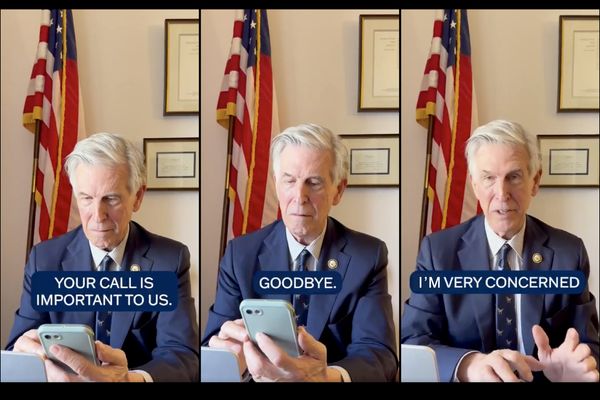When Pedro Trejos was in his early 20s, the Nicaraguan-born construction worker was on the second-floor of a job site in Miami when he lost his footing in a spell of dizziness.
His colleagues helped him up and called emergency services, who told him that he was dehydrated because of the hot temperatures.
“If the security band hadn’t been there, I wouldn’t be talking to you today,” he said.
Like many other migrants, Trejos has spent his three decades in the United States laboring outdoors: repairing roofs, making fences, painting walls. Along the way, he has experienced abuse from patrons, he told the Miami Herald.
“They take advantage of one’s needs. One (employer) told me, there are 30 or 40 or 50 behind you in line waiting to take your job. Instead of giving you a break, and saying look, drink water, sometimes they don’t even let you go to the bathroom,” he said.
Now, Trejos is part of the Que Calor Campaign, an initiative from immigrant workers’ organization WeCount! to secure outdoor worker protections against heat. Along with other advocates and laborers, he is pushing for a bill in the Florida Legislature that would extend heat protections for outdoor workers state-wide.
The bill passed in mid-January in the Senate Agriculture Committee in a unanimous vote. With climate change poised to increase the number of dangerously hot days — and outdoor workplace hazards along with it — the measure and its bipartisan support is a welcome step for workers who labor day in and day out under the hot Florida sun.
“We are human beings.... The fact that we work under the sun, that we work hard, does not mean we are not human beings, that we don’t deserve respect,” said Trejos.
Unanimous support for the bill
The bill, SB 732, introduced by Republican Sen. Ana Maria Rodríguez, requires employers to put in place heat-exposure safety programs that offer preventive measures for workers against heat, like access to sufficient, free drinking water as close as possible to the workplace. Workers who show mild to moderate heat illness must be pulled out of work and evaluated to see whether medical attention is needed.
Managers and employees must attend annual training on how to prevent, spot and treat heat-related illness. And “high-heat procedures” kick in based on the outdoor heat index. When temperatures are above 90 degrees Fahrenheit, employers must provide 10 minutes of rest every 2 hours.
If passed, the law would take effect in October. However, the bill — which has an identical counterpart in the House of Representatives — does not carry penalties for employers.
Current protections lacking
Advocates say the measure would start the ball rolling on heat protections for workers, since the federal government has yet to introduce any specific rules for taking care of outdoor workers in extreme heat conditions.
While the Occupational Safety and Health Administration recommends employers offer their employees rest, shade and hydration when temperatures spike, the agency doesn’t really come into play until tragedy strikes.
In late January, OSHA said it plans to fine a North Florida company about $25,000 after a 41-year-old employee clearing invasive plants on a 97-degree day in July died from heat-related complications. His supervisors had him rest, but once he started feeling sick there was no one nearby to provide first aid and potentially save his life. The Florida man was one of the 38 people who die each year, on average, from extreme heat while working.
Last year, OSHA announced plans to set a federal heat standard, which would have strong, enforceable rules on how employers are supposed to keep their employees safe, similar to those used by the military. The agency first described a need for this standard in 1972, but it never followed through. Advocates cheered this welcome change but noted that it could be years before that standard applies.
In the meantime, a state rule could offer another layer of protection for Florida’s 2 million outdoor workers, who make up a quarter of the state’s workforce.
“The time is urgent, the time for action is now, and we believe and the leaders of Que Calor believe that this state bill is a step in the right direction. It is a great starting point.”’ said Esteban Wood, Policy and Civic Lead for WeCount!, which is based in Homestead.
There is also support for the bill from some outdoor employers, like Jon Esformes, chief executive officer of Sunripe Certified Brands, which farms tomatoes and citrus in Florida, Georgia, Tennessee and Mexico. In 2010, Sunripe Certified Brands entered an agreement with the Coalition of Immokalee Workers to set new labor standards.
Esformes spoke in support of the bill at the Senate Agriculture Committee hearing.
“This is a really good bill, because it encourages people, without penalties, to do the right thing, and to provide the kind of environment that people can be safer in. I believe the passage of this bill will ensure that the worker of tomorrow is safer than the worker of today,” said Esformes, who said he has been “deeply involved” in advocacy for agricultural workers’ labor rights across North America for 12 years.
He said that the partnership has helped build trust between employers and employees and helped the company develop extreme heat safety protocols, anti-sexual harassment education and COVID-19 management policies.
“I’m not sitting here pointing a finger saying, ‘Gee, you have all been doing it wrong for all these years.’ I’m actually one of the people who participated in that for many years, and I’m saying I did it wrong, we did it wrong, and we’re not going to do it that way anymore. Having a safe and fair work environment is the right of every employee in any industry,” said Esformes.
The head of the major tomato grower said that as “labor becomes a critical issue,” employers across industries will take a look at their own operations as they struggle to retain workers.
“For example, heat stress. If people don’t feel safe or cared about, in a [tight] labor environment, they can find other work,” said Esformes, adding that state government needs to make Florida an attractive place for people to work.
Impacts on the human body
The human body is designed to sweat itself cool when temperatures rise, but at a certain point that process doesn’t work anymore.
“The higher the humidity the less our bodies are able to compensate. Our protective mechanism of sweating is no longer effective,” said Dr. Catherine Toms, member of the steering committee of Physicians for Climate Action.
Even before that point, the heart gets stressed from trying to pump blood to the skin faster. People with pre-existing conditions are more likely to hit that danger point earlier. And repeated exposure to high heat without proper hydration can cause kidney disease, a commonly documented condition in farmworkers.
And if outdoor workers happen to also live in places without air conditioning — like seasonal work camps or substandard urban housing — they can’t cool off at night and their bodies never get a rest, Toms said.
She supports the bill but would like to see either state or federal laws that force employers to offer shade, rest, water and medical care to their employees.
“It’s not enough just to have recommendations, I think. There needs to be accountability,” she said.
After a 16-year-old student from Lee County collapsed and died of heatstroke during football practice, his mother helped pass a 2020 law that forced schools to do more to keep student-athletes safe in high heat, like keep water-filled tubs and other rapid-cooling techniques on hand.
That bill, unlike the 2022 outdoor worker one under consideration, makes those protections mandatory.
Miami-Dade’s efforts
In Miami-Dade there are an average of 154 days a year where temperature and humidity combine to make it feel like 90 degrees Fahrenheit or hotter, according to calculations by the Union of Concerned Scientists. If climate change continues unabated, that number could creep to 187 days a year by mid-century. But the real change could be in days where it feels like 100 or more. Miami-Dade has about 41 of those days a year now, and it could skyrocket to 134 days a year by mid-century.
That looming risk inspired Miami-Dade to designate its first-ever Chief Heat Officer, Jane Gilbert, and announce a “heat season” running parallel to the annual hurricane season. The county assembled a task force to suggest policies on protecting outdoor workers and residents who live without proper air conditioning. Its plan is due in May.
Gilbert said the county is supportive of the state bill.
“The cost of inaction to employers could be far more… workman’s comp increases, lost time on the job, turnover when labor shortages are already high. If you’re only concerned about the bottom line it makes sense,” she said. “We’re really thrilled the state is taking a leadership role and following up on what they did with student-athletes.”
Martha Gabriel, a 41-year-old Mam woman from western Guatemala, has lived in Homestead for about five years, making a living working in agriculture and plant nurseries.
“When it is very hot, that is when you regret coming here to this country,” said Gabriel. “I worked with some men in the countryside who did not give water or shade.”
One day, Gabriel was in the tent of a plant nursery when she fainted, and felt like she was seeing stars. A friend accompanied her out of the tent to help her get better. Her supervisor came by.
“When he asked what we were doing there, my friend said that I had fainted. He asked if I was better, and when we said yes, he sent us back to work,” recounted Gabriel.
Gabriel, who is also a member of WeCount!’s Que Calor campaign, hopes that the bill in Tallahassee will earn outdoor workers protections that can prevent situations like hers from happening.
“We want a law that can protect us. We want water, shade, rest,” said Gabriel, “If there is no law, they will keep exploiting workers.”







